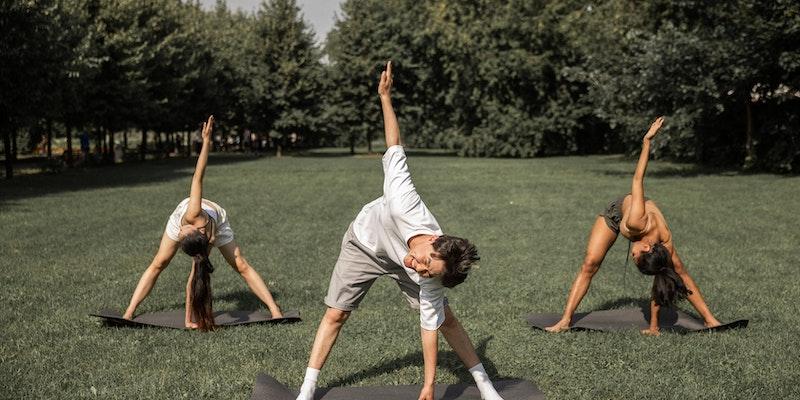Group Workouts: Why They Yield Better Health Returns
Oct 10, 2023 By Nancy Miller
Exercise undoubtedly, plays a significant role in maintaining our health and well-being. While solo workouts offer flexibility and can be tailored to individual preferences, growing evidence suggests that participating in group exercise classes provides many health benefits that can be hard to achieve when exercising alone.
Social Interaction and Community Building
When you participate in group exercises, you're not just working on your fitness. You're also stepping into a community where every member is supportive and driven. Group exercise classes become social hubs where people from different walks of life come together with a shared passion for health. The beauty of this setting is the formation of genuine friendships and connections.
As participants sweat it out side by side, they build relationships that often extend beyond the gym. The encouragement and camaraderie in group exercise classes are invaluable. Imagine finishing a challenging routine and having multiple people congratulate and cheer for you. You don't merely exercise in such courses; you grow together.
Enhanced Motivation and Accountability

The beauty of group exercise classes is that they bring people together under a canopy of shared goals. When you see fellow participants giving their best, it acts as a catalyst for your motivation. The group setting gives rise to an infectious energy that’s hard to resist. You’ll find that your initial resistance to that extra push-up or sprint fades away as the group’s enthusiasm envelops you.
Moreover, group exercises focus on more than physical well-being. Integrating mindfulness exercises for groups in these classes ensures holistic health benefits. Imagine missing a session and receiving light-hearted messages from friends asking about your whereabouts. This kind of accountability, sprinkled with genuine concern, makes group exercise classes unique.
Structured Workouts with Professional Guidance
Exercising in a group isn’t just about camaraderie but also about the structure and guidance that comes with it. Group exercises are often designed and led by experienced instructors who ensure everyone gets the most out of every session. Their expertise guides participants through routines that maximize benefits while minimizing injury risks. For instance, someone will always guide you if you’re new to exercising and uncertain about a particular posture.
Beyond the traditional workout structures, the latest trends, like group mindfulness exercises, are seamlessly integrated into these sessions. This combination ensures that you’re not just working on your body but also on your mind. Whether you're a novice or a seasoned fitness enthusiast, group exercise classes offer a balanced and well-rounded approach to health while ensuring you have fun and stay safe.
Mindfulness Exercises for Groups and Mental Health Benefits
Apart from the physical benefits, group exercise classes often incorporate mindfulness exercises for groups. Such exercises can significantly enhance mental well-being. Participants learn to focus on their breath, posture, and movement, creating a meditative experience. Combining physical activity with group mindfulness exercises can reduce stress and anxiety and boost overall mental health.
Diverse and Fun Workouts
Variety is the spice of life. Group exercise classes often rotate routines or offer various workouts – from Zumba to Pilates to HIIT. This diversity keeps participants engaged and can make the fitness journey enjoyable. The upbeat music, synchronized movements, and collective energy in group exercises make the experience fun and exciting.
Improved Self-Esteem and Confidence
Engaging in group exercises can foster a sense of accomplishment. As participants witness their progression, achieve fitness milestones, and receive peer encouragement, their self-esteem and confidence soar. This positive feedback loop can inspire people to set loftier fitness goals and consistently strive to achieve them.
Role of Group Exercises in Weight Management

Weight management becomes more achievable with group exercises. Consistent workouts, increased motivation, and social support make it easier for individuals to maintain or lose weight. The shared experiences and tips within the group can further aid in dietary choices and building a healthier lifestyle.
Economic Advantages
Group exercise classes can also be cost-effective. They often come at a fraction of the price of personal training sessions, making them accessible to a broader audience. This affordability can enable more people to commit to regular fitness routines.
Mindfulness Exercises for Groups in Rehabilitation
Rehabilitation centers and physiotherapy units are increasingly incorporating mindfulness exercises for groups into their programs. Group exercises and mindfulness practices have shown promising results in aiding recovery, improving flexibility, and reducing pain perception in patients.
Boosting Immunity and Longevity
Regular exercise boosts immunity, and group exercises are no exception. The consistent routine and the mental health benefits of mindfulness exercises for groups can contribute to a strengthened immune system. Over time, this can improve overall health and extend longevity.
The Comparative Impacts of Group and Solo Workouts
The myriad benefits of exercise, especially its influence on mental health, have been established in numerous studies. Some acknowledged benefits are enhanced mood, sleep, energy levels, and cognitive sharpness. New research sought to understand how group exercise classes compare to solo workouts, especially among medical students, a demographic notorious for high-stress levels.
Investigative Approach
In this research, 69 medical students became participants in one of three distinct exercise regimes. The first group partook in group exercise classes that focused on core strength and functional fitness for a minimum of 30 minutes weekly, with the option to engage in additional workouts. The second group comprised independent exercisers who preferred working out solo or with a maximum of two partners, clocking in two sessions weekly. The last group served as a control, limiting their physical activity to merely walking or biking for commuting purposes.
Measurements and Outcomes
Before the study's initiation and every subsequent month, researchers assessed the students' self-perceived stress and quality of life across three domains: mental, physical, and emotional well-being. Remarkably, all students had a similar baseline in these metrics.
Post 12 weeks, those participating in group exercise classes witnessed notable advancements in all the quality of life categories and a significant decrease in stress levels. In stark contrast, despite spending an additional hour working out weekly, solo exercisers only reported an enhancement in mental well-being. The control group's stress and quality of life metrics remained relatively stable.
Limitations and Considerations
This study has its challenges. Its restricted scope – only encompassing medical students – and participants' voluntary choice of exercise regime can introduce biases. Potential inherent differences between those who prefer group exercises and those who opt for solo workouts could also skew the outcomes. Hence, one should interpret the results with care. However, it's undeniable that the study shines a light on the possible advantages of engaging in group exercise classes.
On this page
Social Interaction and Community Building Enhanced Motivation and Accountability Structured Workouts with Professional Guidance Mindfulness Exercises for Groups and Mental Health Benefits Diverse and Fun Workouts Improved Self-Esteem and Confidence Role of Group Exercises in Weight Management Economic Advantages Mindfulness Exercises for Groups in Rehabilitation Boosting Immunity and Longevity The Comparative Impacts of Group and Solo Workouts Investigative Approach Measurements and Outcomes Limitations and Considerations
Forehead Pimples? 5 Reasons Why They Keep Appearing

Pregnancy and Immunity: Are You at Risk?

Reason Improving Sleep Can Prevent Migraine Attacks

Freedom from Shadows: A Complete Guide to Lightening Dark Armpits

What is Black Tongue

How Does Pustular Psoriasis Appear

What Is a Dental Bridge

The Essential Guide to Stretching Exercises for Improved Flexibility

Folic Acid: A Complete Guide

The Ultimate Guide to the Best Cardio Workouts for Weight Loss

Understanding Treatment Options for Hives (Urticaria)
